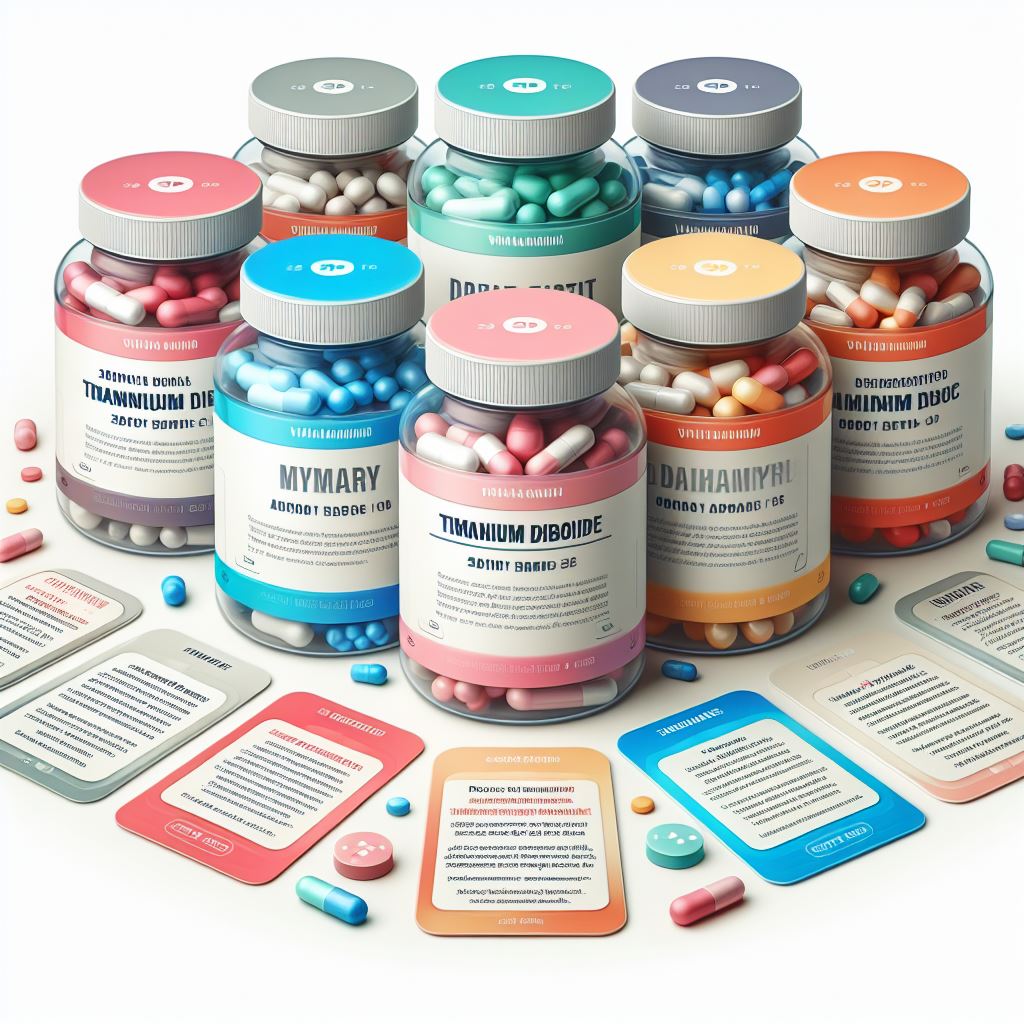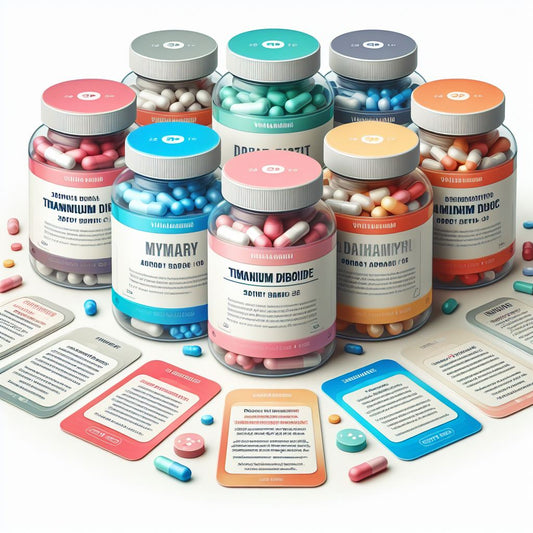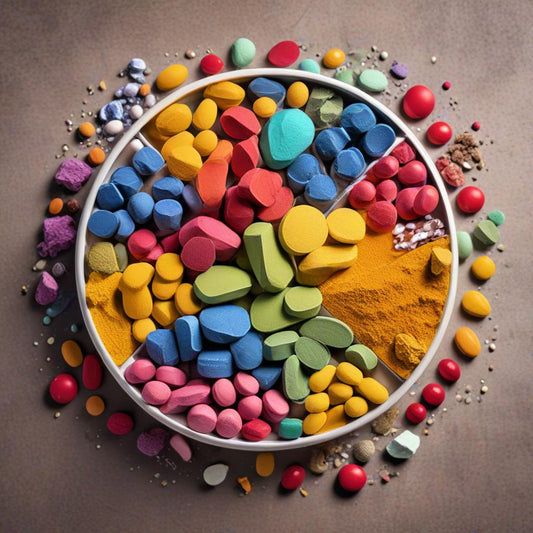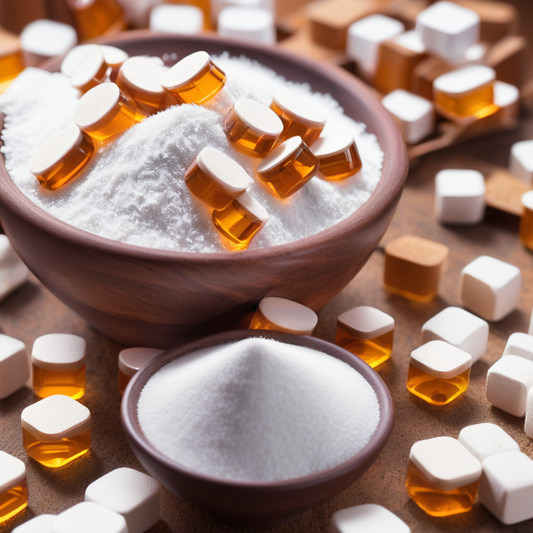Are you a health-conscious individual who relies on dietary supplements? You are doing it for your well-being, right? But ever considered the hidden dangers which come along with tablets, gummies, powders or the strips you are using? Well, indeed there are many. Take Titanium Dioxide for example, which has been used in various supplements for over a century. The pristine white compound has been under intense scrutiny lately. So, why is it harmful? Let us take a look at some of the reasons why the European Union has ordered a sweeping ban across, due to its potential health risks.
Beyond the Bright White Facade: Unmasking Titanium Dioxide
Titanium Dioxide is a naturally occurring mineral. Due to its exceptional ability to scatter light and create a vibrant white hue, it has become a staple in modern manufacturing. Not only food products and supplements, it is a sought out ingredient in paints and plastics as well. When it comes to supplements, TiO2 is primarily used as a colour enhancer and white pigment. Even though the ingredient has proved to be flexible in nature, the research suggests titanium dioxide nanoparticles may induce DNA damage and cell mutations, raising concerns about cancer risk.
The EU Takes a Stand: A Ban Rooted in Scientific Scrutiny
In a groundbreaking move that sent shockwaves through the supplement industry, the European Union implemented a comprehensive ban on titanium dioxide as a food additive in 2022. This ban, which extends to its use in supplements, stemmed from a meticulous evaluation of scientific data revealing a disconcerting link between titanium dioxide and potential health hazards. Studies have raised alarms about its ability to damage DNA, disrupt the delicate balance of the gut microbiome, and even promote tumour growth.
The European Food Safety Authority (EFSA), responsible for assessing the safety of food additives, concluded that titanium dioxide could no longer be considered safe for consumption. Although ongoing research aims to fully understand the extent of these risks, the EU's decisive action underscores the gravity of the situation and the need for caution.
Titanium Dioxide's Dark Side: Unmasking Potential Dangers to Your Health
Beneath its pristine exterior, titanium dioxide harbours a complex web of potential risks. Studies have shown that it can accumulate in vital organs such as the liver and kidneys, raising concerns about long-term health consequences. Moreover, the nanoparticle form of titanium dioxide, commonly used in supplements, has sparked particular alarm due to its ability to penetrate biological barriers and trigger inflammation.
Our gut microbiome, a complex community of microorganisms residing in our digestive tract, plays a pivotal role in our overall health. Disruptions to this delicate ecosystem can have far-reaching effects, impacting everything from digestion and immunity to mental well-being. Emerging research suggests that titanium dioxide may disrupt the gut microbiome, potentially leading to a cascade of adverse health outcomes.
Empowering Yourself: Navigating the Supplement Aisle with Confidence
In light of these concerns, it's imperative to equip yourself with knowledge and make informed decisions about the supplements you choose to trust. Here are some key steps to consider:
- Read the Labels: Take a moment to carefully examine the ingredient list of any supplement you're considering. Look for products that explicitly state "titanium dioxide-free." Many reputable brands have already reformulated their offerings to eliminate this controversial additive.
- Demand Transparency: Seek out companies that are transparent about their sourcing, manufacturing processes, and quality control measures. Reputable brands will readily provide this information and prioritise your safety above all else.
- Explore Alternatives: The world of supplements is vast and diverse, offering a wealth of options. Don't hesitate to explore alternative brands and products that align with your health goals and values. Many companies specialise in natural, whole-food-based supplements that are free from potentially harmful additives.
PatchUP stands as your solution for all the above. Our transdermal patches eliminate the use of any additives. This alternative method of delivery is better and efficient than usual oral methods. Not only TiO2 but PatchUP can help you bypass all the other bad additives. Give yourself a safe nutraceutical dosage with our patches.
The Ripple Effect: Shaping a Healthier Supplement Landscape
The European Union's ban on titanium dioxide serves as a powerful catalyst for change within the supplement industry. As consumers, we have the power to influence the market by demanding safer, more transparent products. By supporting brands that prioritise our health and well-being, we can encourage a shift towards a more responsible and sustainable approach to supplement manufacturing.
Let your voice be heard. Advocate for stricter regulations and greater transparency within the industry. By holding companies accountable and demanding products that truly nourish our bodies, we can create a brighter future for ourselves and generations to come.
Your Health, Your Choice
The presence of titanium dioxide in supplements serves as a stark reminder that vigilance is paramount in our pursuit of health. It's crucial to remember that not all supplements are created equal, and some may harbour hidden dangers. By educating yourself, making informed choices, and advocating for change, you can take charge of your health and ensure that the supplements you consume are truly working in your favour. Choose wisely, choose transparency, and choose a titanium dioxide-free path to wellness.
References
- European Food Safety Authority (EFSA). "Titanium dioxide: E171 no longer considered safe when used as a food additive." 2021. EFSA.
- European Commission. "Commission Regulation (EU) 2022/63 of 14 January 2022 amending Annexes II and III to Regulation (EC) No 1333/2008 of the European Parliament and of the Council as regards the use of titanium dioxide (E 171) in foods." EUR-Lex.
- Nature. "Health concerns over nanoparticles in food." 2021. Nature.
- Bischoff, N. S., de Kok, T. M., Sijm, D. T. H. M., van Breda, S. G., Briedé, J. J., Castenmiller, J. J. M., Opperhuizen, A., Chirino, Y. I., Dirven, H., Gott, D., Houdeau, E., Oomen, A. G., Poulsen, M., Rogler, G., & van Loveren, H. (2020). Possible Adverse Effects of Food Additive E171 (Titanium Dioxide) Related to Particle Specific Human Toxicity, Including the Immune System. International journal of molecular sciences, 22(1), 207. https://doi.org/10.3390/ijms22010207
- Dréno, B., Alexis, A., Chuberre, B., & Marinovich, M. (2019). Safety of titanium dioxide nanoparticles in cosmetics. JEADV. Journal of the European Academy of Dermatology and Venereology/Journal of the European Academy of Dermatology and Venereology, 33(S7), 34–46. https://doi.org/10.1111/jdv.15943
- Frontiers in Pharmacology. "Toxicological Effects of Titanium Dioxide Nanoparticles: A Review of In Vivo Studies." Frontiers.
- Particle and Fibre Toxicology. "Oral exposure to titanium dioxide nanoparticles in food: Prolonged retention and possible health risks." Particle and Fibre Toxicology.





